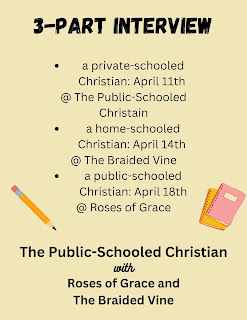Should We Study Lies to Find the Truth?
When you're thinking about discerning truth from lies, you'd think the best approach would be to study truth and lies. That the more time you spend on the lies, the better equipped you'll be to catch them.
That approach has merit. If we research something that turns out to be false, we haven't wasted our time—in fact, we now know that's not true, and will be able to remember that if it ever comes up in conversation.
But while it might be valuable to study false things to learn why they're false, it also can be dangerous. Because the more we think about things of the world, the more we'll be influenced them. You become what you behold, and if you fill your mind with things not of Christ, that isn't going to help you.
In order to find truth, Christians should study the truth. Fill your mind with good and beautiful things, not lies that the world gives.
Because it's by studying the truth that we'll be able to find out the lies.
Bank tellers handle a lot of money. It's their job; they deal with cash and checks and the constant flow of money in and out of bank accounts, so a lot of paper bills pass through their hands.
Also, they're able to detect counterfeit money pretty easily. Criminals sometimes try to deposit fake money into their bank accounts, but it rarely works—the bank tellers know what's real and what isn't.
You might think they have a class in bank teller school all about how to detect counterfeit bills. How you scribble on it with a pen, or hold it up to the light; the top ten mistakes most counterfeiters make, or a four-step process for identifying fake currency.
But that's actually not what they do at all.
Bank tellers can identify fake money because they spend so much time with real money. They're constantly handling it, feeling the texture of the linen paper, the way it folds in their fingers. They know the thickness, the creases of new and old bills, and the colors.
And when something seems off, they notice.
Why does this matter? We're not all bank tellers. Well, we are bank tellers of a sort—we're constantly being told things about what's true and what's not, and it's our job to sift through all of the noise and pick out what's worth keeping.
How do we do this? By inundating ourselves with truth.
Like our bank teller, we need to be handling truth. If we get used to it, if we learn to recognize the way it feels in our mind and the way it looks in the light, then we'll be able to recognize a lie.
Focus on the truth. Think about it. Read about it, listen to it taught. Make sure to meditate on the "real money" that we're given in the Gospel, and not to give weight to a counterfeit—because if you accept false teaching, then your ability to distinguish between truth and lies will be harmed.
Philippians 4:8 tells us what to think about: "Finally, brothers, whatever is true, whatever is honorable, whatever is just, whatever is pure, whatever is lovely, whatever is commendable, if there is any excellence, if there is anything worthy of praise, think about these things."
The message is clear, and repeated seven or eight times. "Meditate on whatever's true," Paul tells us. "On whatever's good, just, commendable, lovely, etc. Don't meditate on anything that's not excellent or worthy of praise."
Why?
Meditating on things that aren't of God doesn't help you. It hurts you in your ability to worship, and it hurts you in your ability to judge clearly. Handling counterfeit money does not help you to find out what kinds of money are counterfeit.
We are called to keep our bodies a temple to the Lord. Aren't our minds a temple too?
"But wait," you may be thinking. "You say we learn what truth is by meditating on truth—but how does that work? Isn't that circular reasoning?"
You're right. Kind of. If you only learn what truth is by meditating on it, then we'd be in a pickle indeed—it'd be hit-or-miss for the first few years, after which there would be a low probability that we'd have found out what truth was. Fortunately, that's not the case.
When bank tellers learn how to find counterfeit money, they handle money that they know is real. Money that's been proven to be reliable, and that comes from trusted sources.
In our search for truth, we can do the same. We've been given a book full of dependably true information that's been confirmed by hundreds of sources. We know who wrote it—all Scripture is breathed out by God—and we know that all of it is true.
Meditating on the Scriptures is the only reliable way of discerning truth.
When you hear a claim, check it with Scripture. No matter who it comes from. When a pop song makes a claim about love, check it with Scripture. When your friend from school says something about the age of the earth, check it with Scripture. Even when your pastor says something about the Christian walk, check it with Scripture.
Humans are fallible. Nobody is right about everything, but we know that the Bible is. If we familiarize ourselves with its text, we'll be well-equipped to find out the truth.
You don't learn fake money by looking at fake money. We shouldn't look at lies to determine what's a lie; we need to look at what we know is true.
John 17:17 - "Sanctify them in the truth; your word is truth."




This is a really good analogy! I love how you make really good comparisons in all of your posts.
ReplyDeleteThank you! I enjoy coming up with analogies; glad someone likes reading them :)
DeleteThis was really well written and well planned out. I enjoyed reading it and will definitely think about what you said.
ReplyDeleteThank you, Desiree!!
Delete